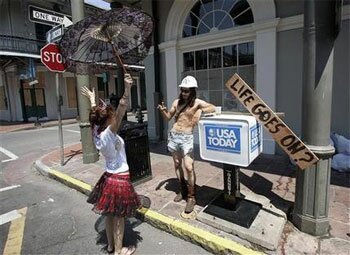Sun 4 Sep 2005

Candice Jameson, 21, holds her umbrella as she celebrates Sunday’s Decadence Parade in New Orleans’ historic French Quarter. (RICK BOWMER / AP)
ALLEN G. BREED, Associated Press, reports:
NEW ORLEANS — In the absence of information and outside assistance, groups of rich and poor banded together in the French Quarter, forming “tribes” and dividing up the labor.
As some went down to the river to do the wash, others remained behind to protect property. In a bar, a bartender put near-perfect stitches into the torn ear of a robbery victim.
While mold and contagion grew in the muck that engulfed most of the city, something else sprouted in this most decadent of American neighborhoods - humanity.
“Some people became animals,” Vasilioas Tryphonas said Sunday morning as he sipped a hot beer in Johnny White’s Sports Bar on Bourbon Street. “We became more civilized.”
While hundreds of thousands fled the below-sea-level city before the storm, many refused to leave the Vieux Carre, or old quarter. Built on some of the highest ground around and equipped with underground power lines, residents considered it about the safest place to be.
Katrina blew off roof slates and knocked down some already-unstable buildings but otherwise left the 18th and 19th century homes with their trademark iron balconies intact. Even without water and power, most preferred it to the squalor and death in the emergency shelters set up at the Superdome and Convention Center.
But what had at first been a refuge soon became an ornate prison.
Police came through commandeering drivable vehicles and siphoning gas. Officials took over a hotel and ejected the guests.
An officer pumped his shotgun at a group trying to return to their hotel on Chartres Street.
“This is our block,” he said, pointing the gun down a side street. “Go that way.”
Jack Jones, a retired oil rig worker, bought a huge generator and stocked up on gasoline. But after hearing automatic gunfire on the next block one night, he became too afraid to use it - for fear of drawing attention.
Still, he continues to boil his clothes in vinegar and dip water out of neighbors’ pools for toilet flushing and bathing.
“They may have to shoot me to get me out of here,” he said. “I’m much better off here than anyplace they might take me.”
Many in outlying areas consider the Quarter a playground for the rich and complain that the place gets special attention.
Yes, wealthy people feasted on steak and quaffed warm champagne in the days after the storm. But many who stayed behind were the working poor - residents of the cramped spaces above the restaurants and shops.
Tired of waiting for trucks to come with food and water, residents turned to each other.
Johnny White’s is famous for never closing, even during a hurricane. The doors don’t even have locks.
Since the storm, it has become more than a bar. Along with the warm beer and shots, the bartenders passed out scrounged military Meals Ready to Eat and bottled water to the people who drive the mule carts, bus the tables and hawk the T-shirts that keep the Quarter’s economy humming.
“It’s our community center,” said Marcie Ramsey, 33, whom Katrina promoted from graveyard shift bartender to acting manager.
For some, the bar has also become a hospital.
Tryphonas, who restores buildings in the Quarter, left the neighborhood briefly Saturday. Someone hit in the head with a 2-by-4 and stole his last $5.
When Tryphonas showed up at Johnny White’s with his left ear split in two, Joseph Bellomy - a customer pressed into service as a bartender - put a wooden spoon between Tryphonas’ teeth and used a needle and thread to sew it up. Military medics who later looked at Bellomy’s handiwork decided to simply bandage the ear.
“That’s my savior,” Tryphonas said, raising his beer in salute to the former Air Force medical assistant.
A few blocks away, a dozen people in three houses got together and divided the labor. One group went to the Mississippi River to haul water, one cooked, one washed the dishes.
“We’re the tribe of 12,” 76-year-old Carolyn Krack said as she sat on the sidewalk with a cup of coffee, a packet of cigarettes and a box of pralines.
The tribe, whose members included a doctor, a merchant and a store clerk, improvised survival tactics. Krack, for example, brushed her dentures with antibacterial dish soap.
It had been a tribe of 13, but a member died Wednesday of a drug overdose. After some negotiating, the police carried the body out on the trunk of a car.
The neighbors knew the man only as Jersey.
Tribe member Dave Rabalais, a clothing store owner, said he thinks the authorities could restore utilities to the Quarter. But he knows that would only bring “resentment and the riffraff.”
“The French Quarter is the blood line of New Orleans,” he said. “They can’t let anything happen to this.”
On Sunday, the tribe of 12 became a tribe of eight.
Four white tour buses rolled into the Quarter under Humvee escort. National Guardsmen told residents they had one hour to gather their belongings and get a ride out. Four of the tribe members decided to leave.
“Hallelujah!” Teresa Lawson shouted as she dragged her suitcase down the road. “Thank you, Jesus!”
For Mark Rowland, the leaving was bittersweet.
“I’m heart-broken to leave the city that I love,” Rowland said as he sat in the air-conditioned splendor of the bus. “It didn’t have to be this way.”
AP photographer Eric Gay contributed to this story. Allen G. Breed is the AP’s Southeast regional writer, based in Raleigh, N.C.